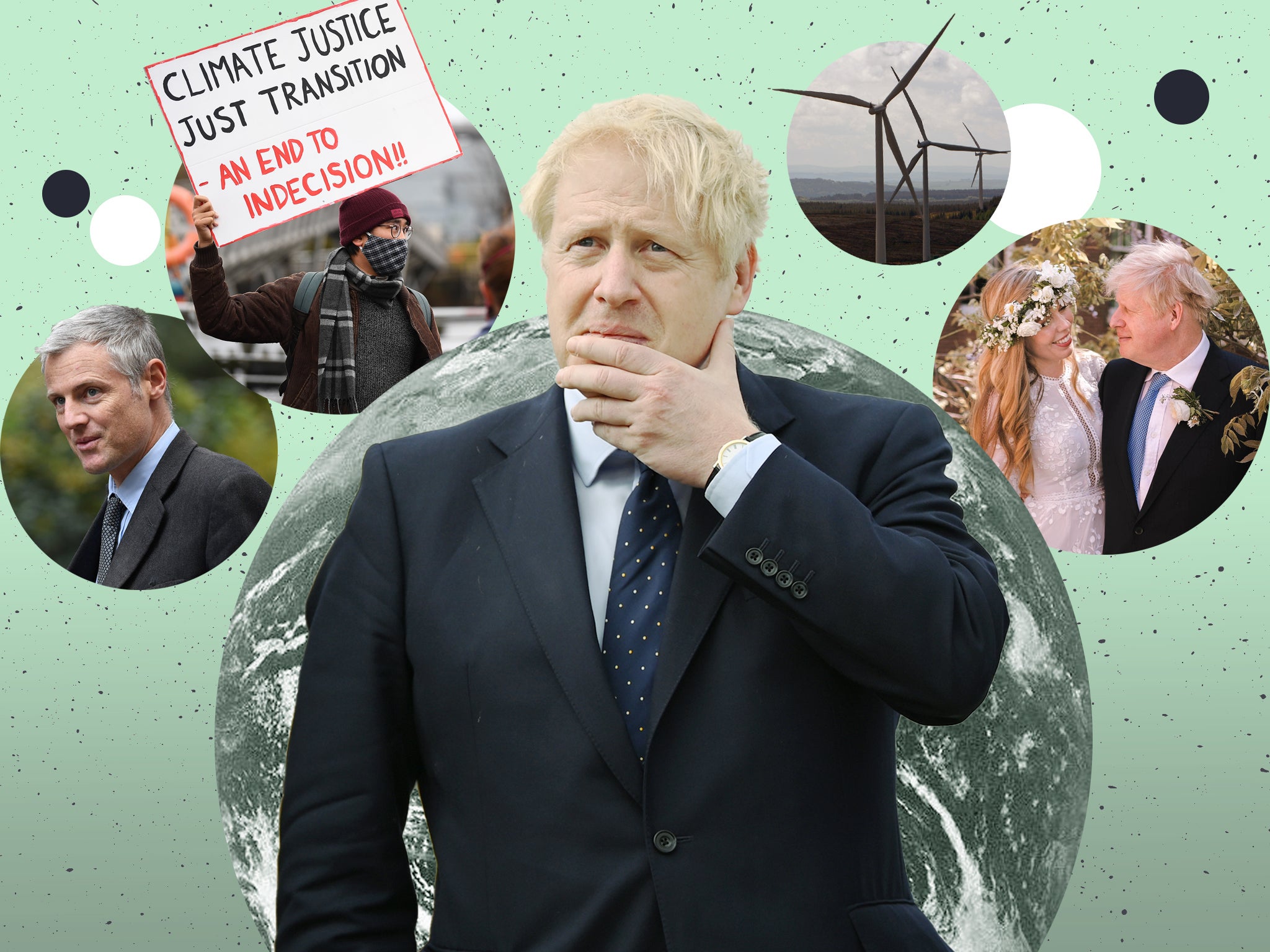How Boris Johnson went from climate sceptic to eco-warrior
The prime minister’s historical cynicism about the biggest crisis facing our planet is well documented, so his call for fellow world leaders to ‘grow up’ and tackle climate change last month raised a few eyebrows. Andrew Grice explores some of Johnson’s past scepticism and considers the factors that led to his U-turn


Your support helps us to tell the story
From reproductive rights to climate change to Big Tech, The Independent is on the ground when the story is developing. Whether it's investigating the financials of Elon Musk's pro-Trump PAC or producing our latest documentary, 'The A Word', which shines a light on the American women fighting for reproductive rights, we know how important it is to parse out the facts from the messaging.
At such a critical moment in US history, we need reporters on the ground. Your donation allows us to keep sending journalists to speak to both sides of the story.
The Independent is trusted by Americans across the entire political spectrum. And unlike many other quality news outlets, we choose not to lock Americans out of our reporting and analysis with paywalls. We believe quality journalism should be available to everyone, paid for by those who can afford it.
Your support makes all the difference.“Is all this real? I’ve never really believed it,” Boris Johnson often quipped to his inner circle of advisers when they discussed measures to tackle climate change. As usual, he was half-joking, but also half-serious.
The prime minister admits his own journey on this issue has been a long one. “I remember how some people used to sneer at wind power, 20 years ago, and say that it wouldn’t pull the skin off a rice pudding,” he told the Conservative Party’s virtual conference a year ago, when he announced that wind farms could power every home in the UK within a decade. Allies admit he was poking fun at himself. In 2012, it was Johnson who said there could be no justification for “crucifying our landscape with wind farms which, even when they are in motion, would barely pull the skin off a rice pudding”.
Today Johnson argues: “To adapt Gordon Gekko: green is good, green is right, green works.” He says the Cop26 climate summit he will host in Glasgow must be a “turning point for humanity”, telling it to “grow up”. As he told the UN general assembly in New York last month: “It is time for us to listen to the warnings of the scientists – and look at Covid, if you want an example of gloomy scientists being proved right – and to understand who we are and what we are doing.”
Johnson has indeed travelled far since his days as a climate sceptic Daily Telegraph columnist who most definitely did not “follow the science”. When scientists linked the 2004 Indian Ocean tsunami to rising sea levels, he declared: “There is no evidence that the planet is suffering from the extreme weather patterns associated with climate change.”
In December 2015, he wrote: “I am sure that those global leaders were driven by a primitive fear that the present ambient warm weather is somehow caused by humanity; and that fear – as far as I understand the science – is equally without foundation. There may be all kinds of reasons why I was sweating at ping-pong – but they don’t include global warming.”
He even suggested that climate sceptic (and now vaccine conspiracy theorist) Piers Corbyn might be right. In 2013, he told Telegraph readers: “I am speaking only as a layman who observes that there is plenty of snow in our winters these days, and who wonders whether it might be time for government to start taking seriously the possibility – however remote – that Corbyn is right,” he said. He wasn’t talking about Jeremy.
During last month’s New York visit, Johnson conceded: “If you were to excavate some of my articles from 20 years ago” some comments “weren’t entirely supportive of the current struggle”.

When the unlikely leader of what he calls a “green industrial revolution” is asked about his conversion, he invokes the John Maynard Keynes explanation, saying: “The facts change and people change their mind and change their views and that’s very important too.” Close allies say Johnson believes the case for action has become “utterly compelling” and is “very gripped by this issue”, while looking at it in a slightly different way to those who view it as only being about cutting carbon emissions.
A crucial staging post on his journey came when he was convinced by the potential of green growth; the “net zero” strategy unveiled last week pledges 440,000 green jobs by 2030. Johnson hopes many will be in the red wall seats in the north and Midlands. Insiders say he has been passionate about the jobs boost for a couple of years and bangs the table about it in every discussion on climate. Johnson believes the Cameron government did not reap a big enough reward in domestic production and jobs from its investment in renewables. As he put it: “It’s vital for all of us to show that this is not all about some expensive politically correct, green act of bunny-hugging ... This is about growth and jobs.”
Johnson’s conversion is not a cynically timed “greenwash” for Cop26 — an opportunity to showcase “Global Britain” works but which also carries the risk of failure. But it is revealing that he speaks about his climate scepticism of “20 years ago” when his change of heart appears to be much more recent. The issue was not a priority during his spell at the Foreign Office, when its number of officials working on climate change dropped by almost 25 per cent. On the day he became prime minister in 2019, he said Britain was “leading the world in the battery technology that will help cut CO2 and tackle climate change and produce green jobs for the next generation”.
That was the year in which his relationship with his now third wife Carrie became public. She is a campaigner on animal rights and plastic pollution. “It seemed to be mainly about Carrie,” one former Johnson aide told me about his green conversion, “but he also responds to elite fashion. He can sense fashion changing. So, as on [support for] gay marriage, he’ll just absorb what’s around him.”
Johnson’s circle of friends includes green figures such as Zac Goldsmith, a FOC (friend of Carrie) he made a peer and environment minister. Zac’s multi-millionaire brother Ben, a financier and influential environmentalist, chairs the Conservative Environment Network and funded the election campaign of Michael Gove, who appointed him to his department’s board when he was environment secretary. Ben Goldsmith described Johnson as “the first real environmentalist PM we’ve ever had” but later conceded that Margaret Thatcher had a claim to the mantle. (She raised concerns about global warming in the late 1980s but later accused left-wingers of hijacking the green movement).
Perhaps Johnson does have green blood. His father, Stanley, is still revered among environmental groups for drawing up the EU’s landmark habitats directive as a European Commission official. Maybe there is a direct line between that and Johnson’s “build back beaver” joke at this month’s Tory conference.
Green groups give the prime minister credit for the “net zero” strategy but, given his track record, some remain wary of whether his conversion is real. One campaigner said: “We have to give him the benefit of the doubt. He is saying some very good things. But the real test will be whether he can get the money out of the Treasury to make the strategy work.”

There were certainly tensions between Johnson and Rishi Sunak ahead of the programme’s launch. Whitehall sources suggest the prime minister told his chancellor he regards “net zero” as important as his “levelling up” agenda. He insisted on £5,000 grants to encourage householders to replace gas boilers with heat pumps and for green levies on electricity charges to eventually switch to gas bills.
Johnson is convinced that government investment is needed to kickstart the market for heat pumps and bring down prices, as happened with offshore wind. But one renewables expert counsels caution, warning: “You can’t just do a cut and paste job for gas boilers. This will require a lot more government funding than it has committed to.”
His critics accuse Johnson of talking up the benefits of tackling climate change without preparing the public for the unpopular lifestyle changes needed – whether flying less, eating less meat or higher charges or taxes on environmental “bads”. His promise in the strategy’s foreword that the UK could “build back greener, without so much as a hair shirt in sight” was classic Johnson cakeism and optimism.
However, Johnson faces conflicting pressures from Tory MPs worried about the cost of “net zero,” who believe he has become "unconservative”. Some even claim the issue could destroy their party, by opening the door for a Nigel Farage figure to exploit the public backlash. The Telegraph, which Johnson still describes as his “real boss” according to Dominic Cummings, urged him to rein in his advisers so he does not allow “a puritanical, anti-growth, anti-consumerist green movement to capture the state and impose its cultural revolution on the population by fiat”.
When Johnson leaves Downing Street, could he revert to type and resume his life as a climate sceptic Telegraph columnist? No, he has travelled too far on this journey to turn back.

Join our commenting forum
Join thought-provoking conversations, follow other Independent readers and see their replies
Comments